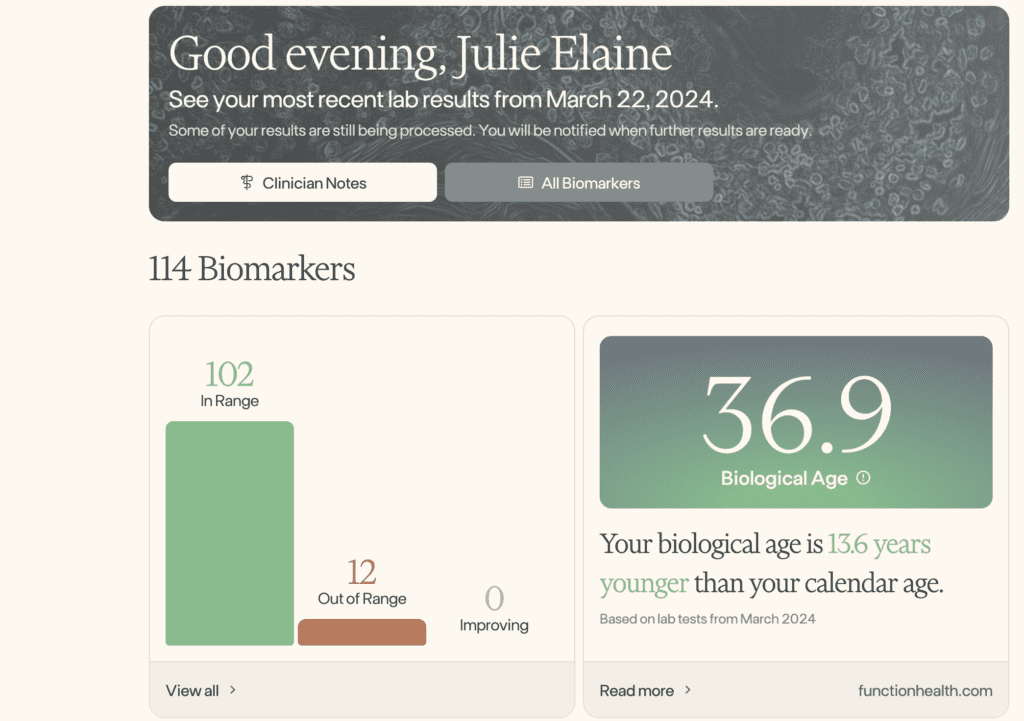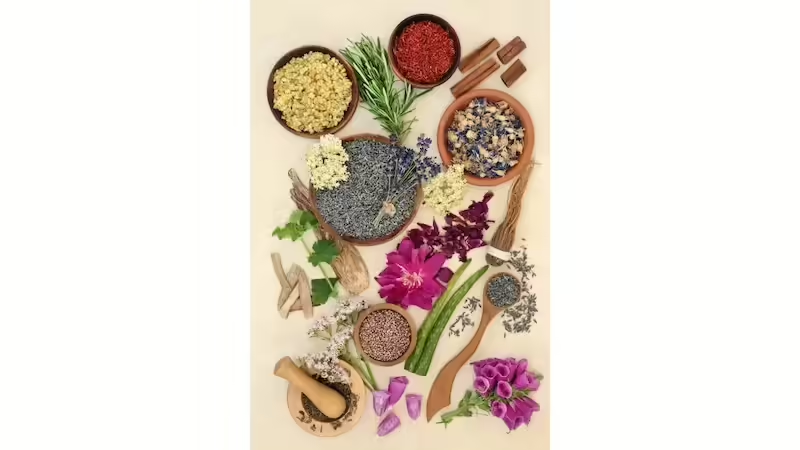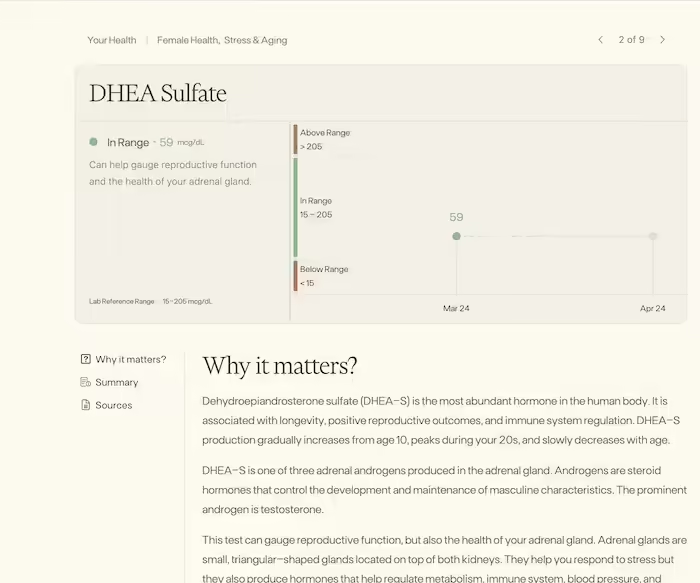
Your Real Age Matters More Than Your Chronological Age
Real age, or biological age refers to how old our cells behave. It’s a good thing if they behave younger! While our chronological age refers to how many years we’ve been alive, the true marker for how healthy we are is our biological age.
Our real age.
According to Function Health, “Biological age…is an indicator of the quality and rate of aging on a genetic, cellular, and molecular level. Faster biological aging increases the risk of diseases associated with aging: prediabetes and type 2 diabetes, cardiovascular disease, cancer, cognitive decline and dementia, kidney failure, hormonal imbalances, muscle and bone loss, autoimmunity, and macular degeneration.”
You may have heard of the term healthspan which refers to how long we stay healthy as we age. Ideally, we extend our healthspan and our lifespan, and live well as long as possible.
Aging Organs and Cells
As we age, every part of us gets older. Our organs, our cells, and even our blood ages (more water in our blood as we age). We often don’t think about all the little indicators of getting old, like having to pee more, or having a longer recovery time after exercise.
We get older and our bladders become weak, which means we can’t hold urine as well. It’s an indicator of our bladders aging.
As we age, our muscles don’t regenerate as fast. Our hormone levels, collagen, and a protein called b1-integrin all decrease with age. These affect how we sleep, move, and function.
We don’t think about all these things that are literal indicators of aging.
Yet we have the capacity to impact how fast every part of us ages! Let’s explore how.
Why My Real Age is 13.6 Years Younger
It turns out my biological age is 13.6 years younger than my calendar age. As some of you know, I had blood work done with Function Health, a new company founded by Dr. Mark Hyman that tracks 114 biomarkers to see how our bodies are aging.
The way Function Health calculated my real age is a proprietary and complex blend of factors. Their blend includes examining my nutrient level, Albumin, Creatinine, Glucose, High-sensitivity C-reactive protein (Hs-CRP), Lymphocyte %, epigenetics (the genes we are born with) and DNA methylation (how we influence our genes with lifestyle choices).
According to my notes on the platform, food is one of the biggest factors for influencing my genes: “You can upgrade or downgrade your biological software with every bite. A diet rich in whole foods, good fats, fiber, probiotics, and phytonutrients can enhance methylation.”
I wasn’t surprised that my cells were tracking younger. I’ve been a vegetarian the majority of my life, exercise regularly, walk my dog daily, and take active measures to reduce my stress.
After my fibroid experience 2 years ago, I started working on reducing my stress. It turns out this was a key ingredient to my ability to “reverse age.” The combination of diet, fitness. and mindset helps support our cells and turn “off” the genes we want to suppress.
What on earth does THAT mean? Let’s get into it.

This is my dashboard from Function Health.
Change Our Environment and Change Our Gene Expression
How many times have you thought, well, it’s genetic so there’s nothing I can do about it?
Well…remember the Madonna song, “Express Yourself?” It turns out we can affect how our genes express themselves. Don’t go for second best, baby!
According to the company I chose to measure my real age;
“Genes are fixed, like keys on a piano. But how genes are regulated is not. A system exists that instructs your cells to turn off or on, or change the expression of your genes.”
We can influence our genes by changing our environment. According to the CDC, “Since your environment and behaviors, such as diet and exercise, can result in epigenetic changes, it is easy to see the connection between your genes and your behaviors and environment.”
Epigenetic modification means literally modifying our experiences, environment, and lifestyle. It’s been proven, time and again–even in children and babies–to rewire our genetic makeup. One study by Harvard explores how nutrition, positive experiences, and diet can change the expression of genes of children!

DNA Methylation: We Have More Control Than We Think
I like deep-diving into the WHY of things. Even though I am not a healthcare professional, I’m trained as a Journalist and am a good researcher.
I love the platform on Function Health because it goes into all the details of how they track biomarkers, and explaining why it matters, and how to influence the biomarkers in positive ways.
I loved learning about DNA Methylation. The best way I can explain it is that not all genes are “on” at all times. And even though we cannot change our genetic makeup, we CAN change how our genes behave, and which ones get turned on and off.
According to Function Health, “Most chronic diseases (and hallmarks of aging, the biological changes that underlie all diseases) are not usually caused by a single gene but rather by changes in your epigenome. Meaning, changes in the way your cells are functioning. DNA methylation—a process that affects gene expression, protein production, repair, hormones, and metabolism—regulates your epigenome.”
We can influence this gene expression. There is no one magic wand to erase aging, but the reality is we can impact how well we age, and we can slow down our aging process.

Five Ways to Reverse Our Cell Age
1. 🧘♀️ Reduce stress, which impacts our cortisol. Reducing cortisol reduces inflammation, which causes disease. According to one study from the Endocrine Division at Massachusetts General Hospital, “Aging is linked to alterations of the hypothalamic-pituitary-adrenal (HPA) axis, including an increase in cortisol levels.”
2. 🌞 Boost DHEA. This hormone declines with age, and impacts our levels of testosterone and estrogen. In women, especially post-menopause, DHEA is the only producer of estrogen! DHEA is responsible for healthy skin, fat burning, and impacts muscle mass. Strength-training, vitamin D, and getting enough sleep boost DHEA.
3. 😴 Sleep well each night for at least 7 hours. Sleep boost DHEA, reduces cortisol, helps with memory and concentration, and improves endurance. Even one night of poor sleep affects aging. A recent study conducted by UCLA researchers found sleep deprivation ages us. “Our data support the hypothesis that one night of not getting enough sleep in older adults activates important biological pathways that promote biological aging,” said lead author Judith Carroll, PhD.
4. 🥕 Eat healthy, colorful foods. For years we’ve known that diet has an impact on how we look and feel. One study found that diet can impact the genes of pregnant and breastfeeding women and their baby! Another study showed younger biological age for all participants with a diet of leafy greens, green tea, and colorful veggies.
5. 🏃♀️Exercise lengthens telomeres, which are directly linked to our age. I like to think of telomeres as the end cap on a shoelace–but instead of a shoelace, they are the endcap of a cell. As we age, they fray and shorten. One study “found that people who performed high levels of physical activity had longer telomeres; in fact, biologically speaking, they were nine years younger than more sedentary people.“
My Biomarkers Weren’t Perfect
I had 12 out of 114 biomarkers that were out of range. 10 of them are related to my heart (15 total heart biomarkers were tested–5 were perfect).
I eat well and exercise every day. Each night I aim for 8 hours of sleep.
But, I have hereditary heart issues in my family on both sides.
And, I knew that when I saw my Omega 3 levels a few weeks ago (see my first blog about my biomarkers), that my heart biomarkers could be impacted. A study in Harvard Health demonstrated how low levels of Omega 3 can lead to cardiovascular issues.
My heart health likely also declined after 2 surgeries for fibroids. And…well, let’s get real, we just came from a long and strange winter in Boston, where I simply did not work out as much, and ate too many cookies from Levain bakery next door.
The thing is…if I hadn’t tested my biomarkers, I would have thought things were perfect. There were no noticeable signs of issues from the outside. I hadn’t gained weight…I was able to run on the treadmill. But clearly things were heading in the wrong direction.
THAT is why testing our biomarkers is important! It helps us see issues we may not have noticed otherwise. We can immediately take action to fix things, and improve our health.
I can work to get all my levels back within optimal ranges.
And then…maybe I can get my biological age even lower! I feel confident and positive I can continue to affect my health with lifestyle choices.

What’s Your Biological Age?
Do you know what your biological age is? Are you curious?
Our bodies tell us a story of what’s going on, but some diseases are sneaky and don’t show symptoms until things have progressed.
I used Function Health for my biomarkers; you can use this link to skip the waitlist.
There are other companies as well–I’m curious about Glycan Age. I might test with a few companies to track my biomarkers and see if I get slightly different results.
Knowing we can make improvements to our healthspan and lifespan with lifestyle changes is empowering! Having biomarkers tested helps us see behind the curtain.
Let me know if you’ve tested your biomarkers and real age in the comments below.



